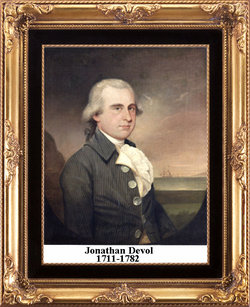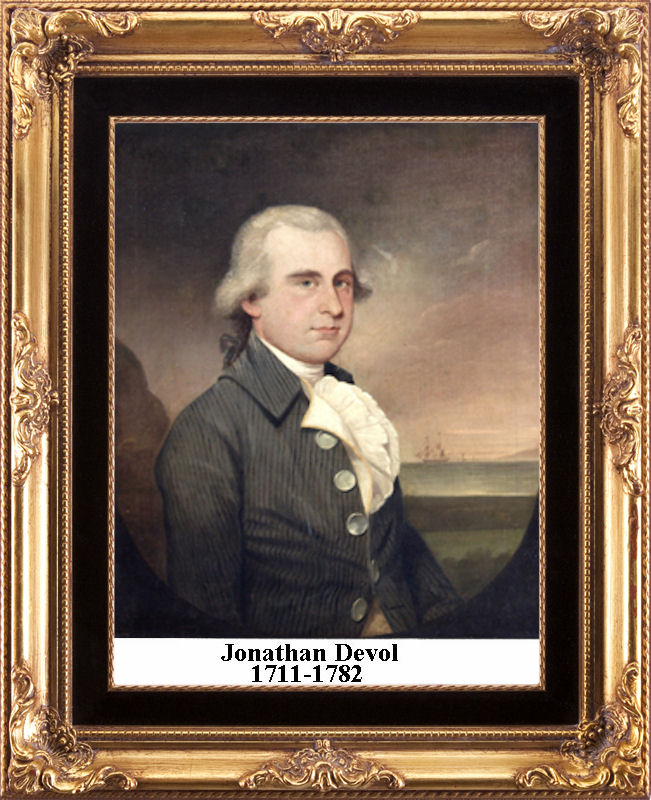Jonathan Devol was a Rhode Island businessman and colonial legislator whose sons became some of Ohio's earliest settlers. He was born August 11, 1711 in Dartmouth, Massachusetts, the seventh of Joseph Devol and Mary Soule Devol's nine children.
In April of 1738, when he was 26, Jonathan married Priscilla Allen, daughter of Gideon and Anna (Buck) Allen of Sandwich, Massachusetts. Priscilla, who was probably 22 or 23 years old at the time, was a Quaker. Two years later, their first baby boy was born, and over the next 15 years Priscilla would deliver eight more sons, among them Stephen Devol, our direct ancestor.
As an adult, Jonathan Devol was active in commerce and civil service. He became a prominent businessman, dealing in West India Produce. In 1763 he was elected to the Rhode Island Assembly, and for a time, also served as treasurer of Tiverton, Rhode Island, his hometown.
In his later years, at a time when most men's lives wind down, Jonathan's underwent turbulent change. In 1775, the first skirmishes of the Revolution disrupted his West India trade. The following February, Priscilla, his wife of 30 years, died. "There deceased my mother Pricilla Devol at 3 o'clock in the afternoon," read the diary of her son (and our ancestor) Stephen Devol.
A year later, in 1776, the colonies declared their independence, breaking forever, all ties with England. Sometime before year's end, Jonathan married a second time, declaring his love for Mary Sherman of Freetown, daughter of Daniel and Sarah (Jenny) Sherman.
Quite a year for a man of 65.
It is said that in his home, Jonathan Devol maintained a small but select library of books, which was the basis for his sons' education. It must have been more than adequate, for despite a lack of formal training, all became successful. One son, Gilbert, even became a Rhode Island Supreme Court Justice. Another made a name for himself as an inventor of an ingenious floating Mill on the Ohio River.
But long before that, as seafarers and shipbuilders, Jonathan's sons crisscrossed the Atlantic Ocean. As soldiers and sailors, they became military officers, and even built ships for the infant American navy. Jonathan Devol saw all of this.
He lived through those turbulent years of the American Revolutionary War, dying in 1782 at the age of 71, ten months after Cornwallis's surrender. Jonathan's will, dated just days before his death, bequeathed land in Sandwich to his wife Mary, and sons Gilbert, Stephen, Daniel, Benjamin, Jonathan and Silas.
Tragically, Silas, a former Boston trader, couldn't return home for the funeral. A naval hero, he was still being held captive with scores of other Americans on an infamous British prison ship, anchored in New York harbor. He died there later that year.
In the 17 years after their father's death, three of Jonathan's surviving sons -- Jonathan Jr., Gilbert and Stephen -- packed up their families and headed to the Northwest Territory, where they became pioneers on the Ohio frontier.
A portrait of Jonathan Sr., painted by 18th century artist Mather Brown, is in the collection of the Ohio Historical Society Museum in Marietta.
Author:
Robert A Smith, Cedarburg WI
[email protected]
Bob Smith
C: 262-993-3061
P: 262-375-1507
Jonathan Devol was a Rhode Island businessman and colonial legislator whose sons became some of Ohio's earliest settlers. He was born August 11, 1711 in Dartmouth, Massachusetts, the seventh of Joseph Devol and Mary Soule Devol's nine children.
In April of 1738, when he was 26, Jonathan married Priscilla Allen, daughter of Gideon and Anna (Buck) Allen of Sandwich, Massachusetts. Priscilla, who was probably 22 or 23 years old at the time, was a Quaker. Two years later, their first baby boy was born, and over the next 15 years Priscilla would deliver eight more sons, among them Stephen Devol, our direct ancestor.
As an adult, Jonathan Devol was active in commerce and civil service. He became a prominent businessman, dealing in West India Produce. In 1763 he was elected to the Rhode Island Assembly, and for a time, also served as treasurer of Tiverton, Rhode Island, his hometown.
In his later years, at a time when most men's lives wind down, Jonathan's underwent turbulent change. In 1775, the first skirmishes of the Revolution disrupted his West India trade. The following February, Priscilla, his wife of 30 years, died. "There deceased my mother Pricilla Devol at 3 o'clock in the afternoon," read the diary of her son (and our ancestor) Stephen Devol.
A year later, in 1776, the colonies declared their independence, breaking forever, all ties with England. Sometime before year's end, Jonathan married a second time, declaring his love for Mary Sherman of Freetown, daughter of Daniel and Sarah (Jenny) Sherman.
Quite a year for a man of 65.
It is said that in his home, Jonathan Devol maintained a small but select library of books, which was the basis for his sons' education. It must have been more than adequate, for despite a lack of formal training, all became successful. One son, Gilbert, even became a Rhode Island Supreme Court Justice. Another made a name for himself as an inventor of an ingenious floating Mill on the Ohio River.
But long before that, as seafarers and shipbuilders, Jonathan's sons crisscrossed the Atlantic Ocean. As soldiers and sailors, they became military officers, and even built ships for the infant American navy. Jonathan Devol saw all of this.
He lived through those turbulent years of the American Revolutionary War, dying in 1782 at the age of 71, ten months after Cornwallis's surrender. Jonathan's will, dated just days before his death, bequeathed land in Sandwich to his wife Mary, and sons Gilbert, Stephen, Daniel, Benjamin, Jonathan and Silas.
Tragically, Silas, a former Boston trader, couldn't return home for the funeral. A naval hero, he was still being held captive with scores of other Americans on an infamous British prison ship, anchored in New York harbor. He died there later that year.
In the 17 years after their father's death, three of Jonathan's surviving sons -- Jonathan Jr., Gilbert and Stephen -- packed up their families and headed to the Northwest Territory, where they became pioneers on the Ohio frontier.
A portrait of Jonathan Sr., painted by 18th century artist Mather Brown, is in the collection of the Ohio Historical Society Museum in Marietta.
Author:
Robert A Smith, Cedarburg WI
[email protected]
Bob Smith
C: 262-993-3061
P: 262-375-1507
Family Members
Advertisement
Advertisement





